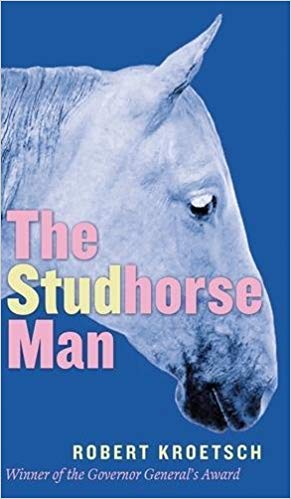
The 15th book in my January Book Project is The Studhorse Man, by Robert Kroetsch late of Alberta. Published in 1969, it has taken me almost forty-four years to get around to it. Of course, I was only six at the time of its publication, so I can be forgiven for some of my delay. But not all of it. Really, I should have read this years ago.
With the flavour of a tall tale, the story comes from a young man named Demeter Proudfoot. Demeter was so named by a mother who aspired to a cultured life but didn’t know that the Demeter of Greek mythology was a woman. He tells the story while sitting naked in a washtub in an institution for the insane. He may be more reliable than one might first suppose since his institutionalization has less to do with the state of his mind than with the unconventional nature of his crimes.
Demeter is in love with his cousin, Martha Proudfoot, who (like many women during World War II) assumed responsibility for the family business (a hotel) while her father was away at war. But Martha is betrothed to Hazard LePage, has been betrothed for twelve years now, waits for him patiently, like Penelope for Odysseus, waits for him eternally, much to Demeter’s frustration.
You see, Hazard is on a quest. Hazard is the studhorse man. He wanders the countryside with his prized stallion, Poseidon, in search of a mare so that Poseidon’s blood line won’t die out. But the world seems intent on hindering his efforts. The war is on and nobody wants (or can afford) to breed a mare. Besides, cars are taking over much of the work that horses used to do. When gas rationing stops, as it surely will, Hazard’s obsolescence will be obvious even to him.
Looming over the whole novel is a sense of passage from old ways to new—along with the violence implied by that passage. Demeter’s mother can’t get the ancient myths right. Indians sit on the periphery and their stories die with them. Pulling a milk cart, Hazard has to give the right of way to a gas-powered truck (giving rise to a colourful yelling match). Hazard tries to raise cash by collecting bones for the war effort, but they’re worthless because the Americans have entered the war with all their new technology. (Bones were used to make airplane glue and munitions.)
Like Odysseus with Circe etc., Hazard sometimes has to do a little stud work of his own. It would appear that Hazard and his horse are joined at the hip, or at least the penis. Demeter bursts in on him while he and Hazard are guests of one Marie Eshpeter:
They were both of them, Hazard and Marie, on the far side of the high old bed—they were both down on their hands and knees. And they did not see me, for Marie was faced away, her lovely full buttocks toward me, crystal smooth in the pale light, bathed in the thinnest gloss of sweat, a gentle arrow of black engaging my eyes where Hazard touched his bearded face to her flesh and nipped at her thigh.
“Hazard?” I whispered, not daring to think or consider.
I swear before God and man that he whinnied.
I need hardly add that I fainted dead away right there on the spot.
This mirrors an earlier scene when Hazard uses his highly specialized skill to coax Poseidon to do whatever studs do to mares (I’m no expert so I don’t know the proper terms).
As with all tales of the John Henry sort, the outcome is inevitable and tragic. The new ways trample the old. But at least until his trampling, never did a character live his old ways with such gusto as did Hazard Lepage.